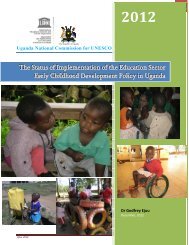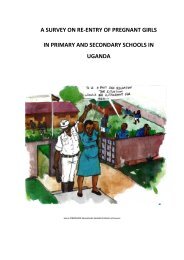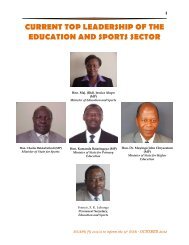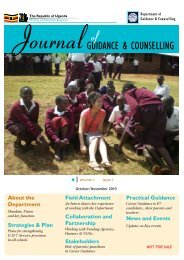Part I - Ministry Of Education and Sports
Part I - Ministry Of Education and Sports
Part I - Ministry Of Education and Sports
You also want an ePaper? Increase the reach of your titles
YUMPU automatically turns print PDFs into web optimized ePapers that Google loves.
(i) New entrants to Primary One<br />
The percentage share of new entrants to Primary One with the eligible age (6 years) remained the<br />
same between 2010/11 <strong>and</strong> the period under review as shown in table:4.3 below.<br />
Table: 4.3.Percentage Distribution of New Entrants to P.1 by Age.<br />
FY 5 Years or Less 6 Years 7 Years 8 Years 9 Years 10 Years 11 Years 12 Years<br />
2010/11 5.1% 45.6% 27.5% 12.1% 4.9% 2.3% 1.0% 1.4%<br />
2011/12 4.8% 45.2% 27.3% 12.1% 4.9% 2.5% 1.1% 2.2%<br />
Source: EMIS 2011/12<br />
(ii) Primary School Enrolment by Region 2010/112011/12<br />
The achievements of UPE are reflected in the increase in the overall enrollments since its inception.<br />
Currently there are over 8 million children enrolled in primary school.<br />
Table: 4.4.Percentage Share of Enrolment in Primary by Region<br />
FY Regions<br />
East Central North S.West West N.East<br />
2010/11 30.1% 22.2% 21.1% 12.8% 12.2% 1.6%<br />
2011/12 30.5% 22.7% 20.8% 12.3% 12.0% 1.7%<br />
Source: EMIS 2011/12<br />
In the period under review there was a total enrolment of 8,317,420 (4,161,057 male <strong>and</strong> 4,156,363<br />
female) out of which the Eastern region contributed the highest number of pupils enrolled in primary<br />
schools with a share of30.5% followed by Central region whose share was 22.7%. The North Eastern<br />
region contributed the least share (1.7%) while that of the West <strong>and</strong> South West was relatively the<br />
same. There has been an increase in the percentage share of pupils in three of the regions <strong>and</strong> these<br />
include the East, Central <strong>and</strong> NorthEastern Regions.<br />
(iii) Status of Classrooms Provision<br />
The introduction of Universal Primary <strong>Education</strong> led to the need for an increase in the number of<br />
permanent classrooms. The continuous financial <strong>and</strong> material support given by the Government<br />
through initiatives like the School Facilitaties Grant (SFG) has resulted into a remarkable increase in<br />
the number of classrooms available. See table 4.5.<br />
Table: 4.5.Number of classrooms available by school ownership<br />
FY Status<br />
All schools Government Private<br />
2010/11 142,802 108,012 34,790<br />
2011/12 144,513 105,958 38,555<br />
Source: EMIS 2011/12<br />
In the FY 2010/11, the total number of classrooms in all primary schools was 142,802, <strong>and</strong> by June<br />
2011/12, the number of classrooms had increased by 1.2% to the tune of 144,513 classrooms.<br />
Consequently, the pupil class ratio was maintained at 54 in FY 2011/12.<br />
ESSAPR FY 2011/12 to inform the 19 th ESSR – OCTOBER 2012<br />
42








